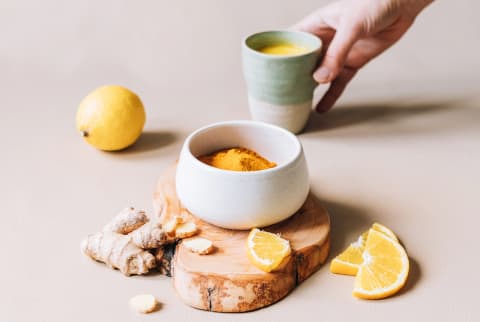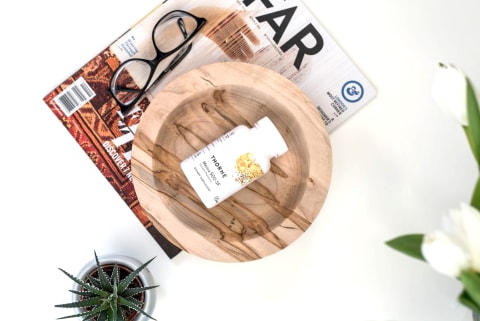Advertisement

A scroll on your feed proves it: Curcumin is the wellness world's current golden child. The bright yellow spice in juice shots, golden milk lattes, and vibrant curries packs quite an antioxidant punch—and it's been touted as a cure-all for everything from joint pain to heart disease to neurodegenerative diseases like Alzheimer's.
So, what is it, exactly? Curcumin, the active ingredient in turmeric root, has been a mainstay of Indian cuisine and ayurvedic medicine for centuries. It makes up 2 percent to 5 percent of dry turmeric spices and gives the spice its yellow color. Curcumin is available as a capsule supplement (like Thorne's Meriva 500), a powder, or in its whole root form.
"Curcumin functions as an anti-inflammatory and an antioxidant, with significant health benefits," says Kelli Fierras, R.D., a nutritionist based in New York. "Most people will benefit from introducing this into their diet unless otherwise told by their doctor or dietitian."
What the studies say.
Though extensive research has been done on the effects of curcumin—many suggesting that the potent antioxidant neutralizes disease-causing free radicals1—more studies are needed to understand how it balances a healthy inflammatory response in the body. For starters, "research shows that it supports brain development and assists in maintaining normal blood sugar levels," says Fierras. "Curcumin may also reduce LDL cholesterol levels and improve triglyceride levels—both are essential to heart health."
Studies have found that curcumin has the potential to prevent neurodegeneration and Alzheimer's disease. It's an area of ongoing research, and studies in vitro and in animal models so far have yielded some promising results. Curcumin is an especially appealing treatment method because it may inhibit the development of Alzheimer's in many different ways—with few side effects.
Similar to how it may help fight neurodegenerative diseases, curcumin appears to target cancer in multiple ways. Curcumin's antioxidant properties protect cells from the damage that can lead to cancer2 in the first place. In addition, animal and in vitro studies have found that curcumin suppresses the growth and development of tumors3.
Curcumin's anti-inflammatory properties also make it a great option for those suffering from arthritis or chronic joint pain. In one study comparing the effectiveness of a prescription pain medication and curcumin supplements, patients saw significantly greater improvements in rheumatoid arthritis symptoms when taking curcumin.
The most efficient way to get it.
The Joint FAO/WHO Expert Committee on Food Additives (JECFA) set the acceptable dietary intake of curcumin as 1.4 mg per pound (3 mg/kg) of body weight per day. But most people don't get close to that number.

"It's hard to consume enough curcumin in your diet unless it consists of turmeric, curry powder, mango ginger, or a supplement," says Fierras. And there's another hurdle: "The challenge with curcumin, either alone or in turmeric, is that it is not easily absorbed by the body."
In order to up the absorption and bioavailability of curcumin, always consume it with black pepper or a fat, such as sunflower oil, olive oil, seeds, or avocado for maximum absorption. "If you're choosing a supplement, check the ingredients," says Fierras.
Whether it's for aches, GI issues, or a general detox, a supplement like Thorne's Meriva 500-SF, which contains three curcuminoids and sunflower oil, could help you maintain a healthy inflammatory response. It's the most clinically studied curcumin on the market and has been shown to have a 29x greater absorption rate compared to ordinary curcumin. It's all thanks to a patented technology that binds the curcumin to the sunflower oil, a phospholipid that's easily absorbed by the body when taken orally. In other words, it's a wellness world power couple.

Want To Be Metabolically Healthy? New Study Shows An Underutilized Approach
Molly Knudsen, M.S., RDN

Bounce Back Quickly After Workouts With This DIY Electrolyte Drink
Molly Knudsen, M.S., RDN

Want To Be Metabolically Healthy? New Study Shows An Underutilized Approach
Molly Knudsen, M.S., RDN

Bounce Back Quickly After Workouts With This DIY Electrolyte Drink
Molly Knudsen, M.S., RDN














